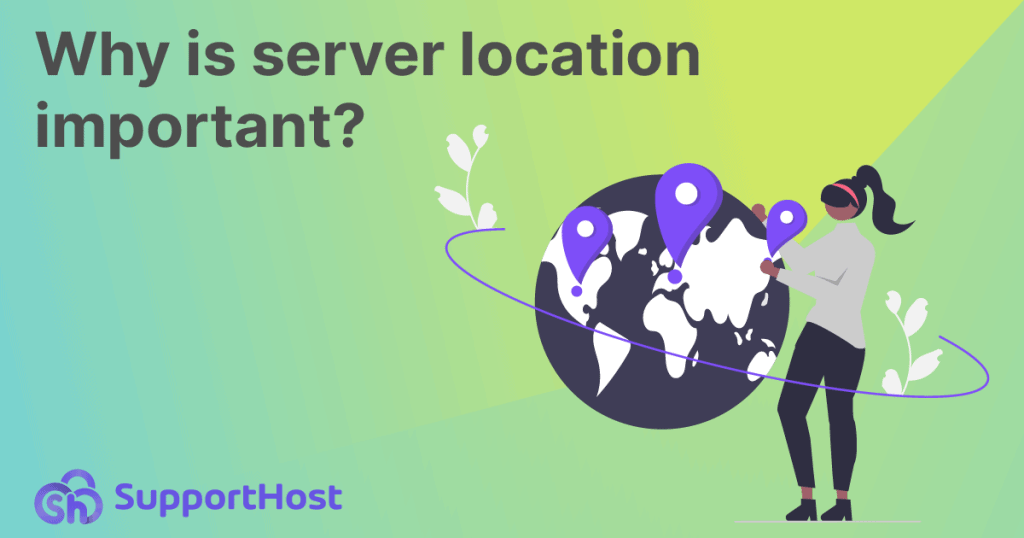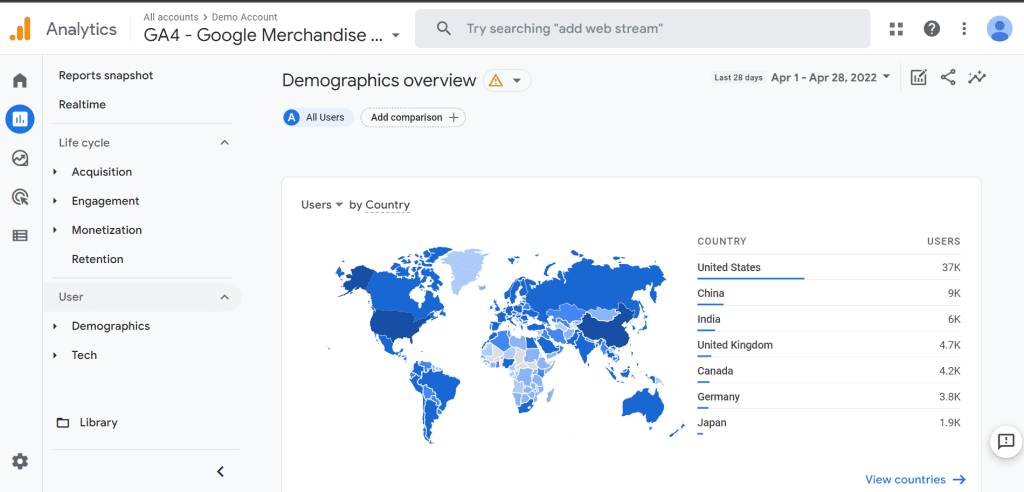When it comes to choosing a hosting people often underestimate the importance of server location.
In fact, in this article, Why is server location important?, the location of data centers can have a major impact on site load times and affect search engine rankings and much more.
Table of Contents

What is server location and why is it important?
Server location is the physical location of the server.
Each server is located in a data center, which is, a facility where the servers and all other components are housed.
For example, power and cooling systems use uninterruptible power supplies to ensure electrical redundancy are part of this system.
Data centers are distruibited all over the world, and their location depends on the hosting service provider you turn to.
As you may already know, the provider often gives you a choice of several alternatives to allow you to choose the server closest to your visitors.

Why is this choice offered? Why does the location of the server matter?
To answer this question, there are important points to consider.
Particularly in terms of performance, SEO and compliance.
Let us start with these very first two points.
Before we see why server location is important and what impact it has on the speed of a website, let’s look at why it is important to have a fast site.
Several things depend on the speed of the site:
- user experience, having a fast site means having satisfied visitors;
- the bounce rate, a slow site pushes users to leave the site immediately;
- site ranking, speed is one of the factors taken into account for ranking and therefore has an impact on SEO.
Now that we have seen why speed is critical, let’s look at what it has to do with server location.
What is the ideal location for the server?
To ensure benefits in terms of performance, search engine ranking and compliance, the server location must be chosen properly.
In particular, reference should be made to the location of site visitors and choose the location of the server accordingly.
If your visitors come from a specific country, in fact, the best choice is to choose the server based on their location.
As a general rule, therefore, one may consider choosing a data center closer to the target audience.
This is because the physical distance between the server and your users affects the loading time of the site.
Therefore, one of the priorities is precisely to identify where most of your audience or customers come from.
To do this you can use Google Analytics and check from the demographic reports what is the location of most visitors.

This gives you a starting point for figuring out the ideal location for the server on which you are going to host your site.
There are, however, still other observations to be made.
Italian or European server: what are the differences?
We said that the location of the server should be chosen according to where the users are.
For example, let’s assume that a website receives 90% of its traffic from users in Italy. In this case does it make sense to choose an Italian server?
Well…It depends.
It would be logical to think that a server in Italy would have lower latency for an Italian user than a server in a foreign data center.
But how do things really stand?
To understand what factors influence the choice of server location, we need to make a premise about the network infrastructure in Italy and Europe.
The network and interchange points
The network consists of interchange points called Internet Exchange Points (IXPs) or Neutral Acces Points (NAPs). These interchange points allow the exchange of data between different providers and CDNs, so information can reach all destinations.
Each country has one or more Internet Exchange Points, for example in Italy the main one is located in Milan and is MIX (Milan Internet eXchange).
At the national level, we also find the GARR network, which was created to connect the education and research communities. This network is part of the European GÉANT backbone, an infrastructure created through the collaboration of among 26 nationwide networks.
The presence of these interchange points provides greater efficiency because it creates redundancy in the infrastructure, saves costs and, most importantly, reduces latency.
In the absence of interchange points, the connection between two networks could not be made directly, but would require passing through external networks, consequently leading to greater delay.
To understand what the importance of server location is, we need to understand the concepts of bandwidth and latency.
This will allow us to understand why it is not always true that an Italian server is to be preferred over a European server.
Bandwidth and latency
Bandwidth represents the ability of the network to transfer a given number of packets per second. Bandwidth, which is expressed in bits per second, depends on the quality of the network and thus the infrastructure.
Latency, on the other hand, is the time it takes for data to be transferred from one point in the network to another. It is expressed in milliseconds.
In fact, when a user visits a Web site, an exchange of data takes place between the computer and the destination server, which are called packets. Between the starting point and the destination of these packets there are a variable number of network knots, called hops.
The number of hops depends on the physical distance between the computer that is connecting to the site and the server and the path. If the packet has to travel more knots, regardless of the actual distance between the starting point and the destination, it will result in higher latency.
This means that more time will be required to establish the connection with the server.

Therefore, latency does not depend solely on the distance between the user’s computer and the server, but is also affected by the number of knots between the source and destination of packets. Latency, and thus the time it takes to establish the connection, also depends on the quality of the infrastructure.
Now that we have clarified these two concepts, we can answer the initial question about server location. What is the ideal choice? It depends on your target market.
Therefore, let us take two examples: visitors mainly in one country, for example, Italy, and visitors from all over the world.
Visitors in Italy, is it better to have an Italian or European server?
Since the number of knots affects latency, it cannot be assumed that an Italian server will provide lower latency than a server in a data center in Europe.
Consider connecting from Italy to a server in Europe near an interchange point and one in Italy located in a data center far from an interchange point. Depending on the number of knots and the quality of the infrastructure we might have lower latency using a server in the Netherlands or Germany than one in Italy.
Visitors around the world, which server location to choose?
The considerations about choosing between a server in Italy and one in Europe can be applied if all the visitors are from the same country, in our case Italy.
The same principle can also be applied to other countries, and specifically, therefore, for latency, one must consider both the distance between the server and the user and the number of intermediate knots.
If, on the other hand, your site’s intended audience is on a global scale alternative considerations must be made.

In fact, in this case, you could use a CDN such as CloudFlare to make the site run faster. A CDN or Content Delivery Network is a system that allows certain parts of the page to be loaded from a server near the user who is visiting the site.
For example, if your site is on a server in Germany and a user connects from Japan, instead of having to load the page directly from the server in Germany, it will load some of the content from a CDN server closer to him, for example from a server in Hong Kong. This ensures faster loading times.
Legal compliance and GDPR
So far we have seen how server location affects site performance in terms of latency and speed.
As we said, performance is reflected in multiple areas and provides a better user experience and improvements in terms of ranking in SERPs. These two aspects can potentially translate into more conversions.
However, the location of the server is not only important for the performance of the site, but it is also important for the legal implications and in particular with regard to data processing.

When choosing a hosting you should, in fact, inquire about the location of the servers and compliance with GDPR, the European regulation on the processing of personal data.
If your users are in Europe, the best option is to choose a server located in Europe that is GDPR compliant.
Also feel free to read our Q&A series on Google Analytics and GDPR, where we discuss server location and US-based providers.
Conclusion: how do I choose the ideal server location?
As we have seen in this article, Why is server location important?, while choosing a server location with the best possible performance and fast loading times for your users, you cannot rely solely on the distance between the server and your target audience.
You should also consider latency, so ultimately the best option is to test. As always, the best way to choose a hosting is to put the service to the test.
In our case, it’s quite easy, you can try our free hosting for 14 days and see if it’s right for you. You can choose the server location closest to your audience; in Europe our data centers are located in Germany, while in the U.S. they are located in Virginia.





Leave a Reply